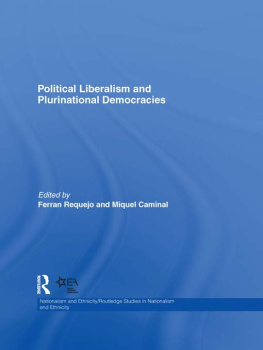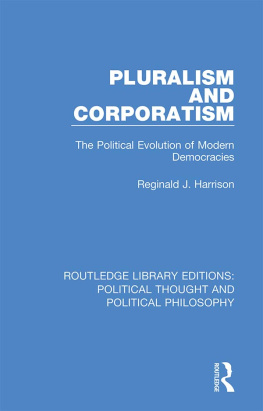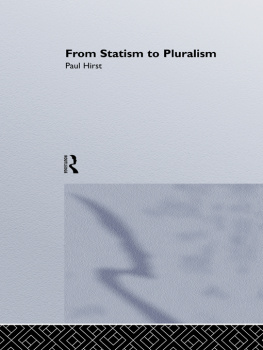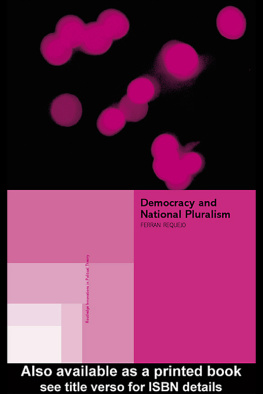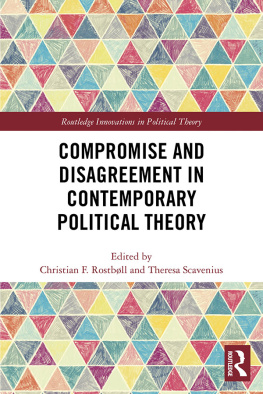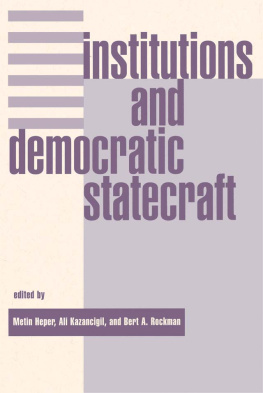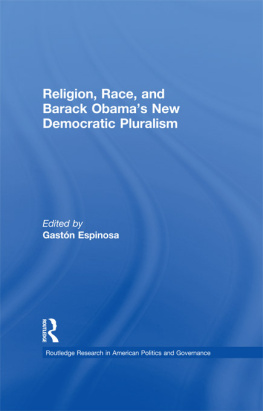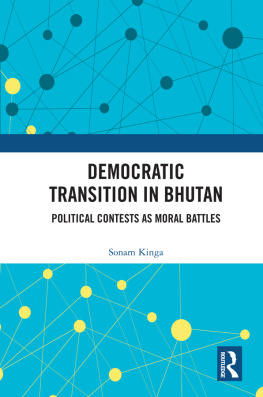Pluralism by Default
Pluralism by Default
Weak Autocrats and the Rise of Competitive Politics
LUCAN WAY

2015 Johns Hopkins University Press
All rights reserved. Published 2015
Printed in the United States of America on acid-free paper
9 8 7 6 5 4 3 2 1
Johns Hopkins University Press
2715 North Charles Street
Baltimore, Maryland 21218-4363
www.press.jhu.edu
Library of Congress Cataloging-in-Publication Data
Way, Lucan, 1968
Pluralism by default : weak autocrats and the rise of competitive politics / Lucan Way.
pages cm
Includes bibliographical references and index.
ISBN 978-1-4214-1812-4 (paperback : acid-free paper) ISBN 1-4214-1812-6 (paperback : acid-free paper) ISBN 978-1-4214-1813-1 (electronic) 1-4214-1813-4 (electronic) 1. Political participationBelarus. 2. Political participationMoldova. 3. Political participationUkraine. 4. DemocratizationBelarus. 5. DemocratizationMoldova. 6. DemocratizationUkraine. 7. BelarusPolitics and government1991 8. MoldovaPolitics and government1991 9. UkrainePolitics and government1991 I. Title.
JN6649.A15W38 2015
323.040947dc23
2015010633
A catalog record for this book is available from the British Library.
Special discounts are available for bulk purchases of this book. For more information, please contact Special Sales at 410-516-6936 or specialsales@press.jhu.edu.
Johns Hopkins University Press uses environmentally friendly book materials, including recycled text paper that is composed of at least 30 percent post-consumer waste, whenever possible.
For Idris and Kamran:
Like this book, you demonstrate the upside of chaos.
Contents
Acknowledgments
This book began as an off-handed comment in graduate school about the sources of pluralism under Yeltsin and became a book project when I was an Academy scholar at Harvard. The Harvard Academy provided me the original freedom and stimulation to conceive of this project. During my time there, I benefitted in particular from the encouragement and inspiration of Samuel Huntington, who then headed the Academy. His Political Order in Changing Societies had already pushed me to move beyond narrow institutionalism in graduate school and inspired the core ideas of this book.
The Department of Political Science at Temple University, where I had my first job, also gave early financial support and warm encouragement for this project. I benefitted in particular from interactions with Richard Deeg and Joe Schwartz. More recently, the Department of Political Science and the Centre for European, Russian, and Eurasian Studies at the University of Toronto have offered an unmatched intellectual community for the study of comparative and postcommunist politics. I owe particular gratitude to Susan Solomon for her friendship, comments on early drafts, and discussions about the concept of pluralism. The Connaught Fund at the University provided key assistance for this project. I also thank Olga Kesarchuk and Elena Maltseva for their assistance and Adam Casey, the hardest working RA in show business, for his extraordinary help on penultimate drafts.
Larry Diamond, Kathryn Stoner and the Center on Democracy, Development, and the Rule of Law at Stanford provided a sublime setting for a sabbatical and an opportunity to write substantial portions of this manuscript. I am thankful to Larry as well as to Marc Plattner at the Journal of Democracy for providing an early platform for my ideas.
Others have offered invaluable feedback at various stages of the project. Jerry Easter, Steve Fish, Anna Grzymala-Busse, Axel Hadenius, Pauline Jones Luong, and Mike McFaul provided early advice and encouragement. Mark Beissinger was gracious enough to read the entire manuscript closely and offered many invaluable insights. Igor Botanu, Sergiu Buscaneanu, Charles King, and Vladimir Solonari gave invaluable assistance during my first trip to Moldova. Vitali Silitski assisted me in Belarus and inspired me with his wisdom and courage. I have also benefitted from innumerable conversations with Paul DAnieri, Serhyi Kudelia, Taras Kuzio, and Oxana Shevel, about Ukraine. Dominique Arel was brave enough to host a seminar on my Ukraine chapter when it was 150 pages long. Antoinette Handley, Adrienne Lebas, and Will Prichard allowed me to benefit from their deep knowledge of African politics. I also thank Ben Smith for responding to my repeated missives about the resource curse. I am grateful for feedback by participants in seminars at Lund University, New York University, Princeton, University of Michigan, Uppsala University, and Yale.
Henry Hale organized a fantastic book incubator conference at George Washington Universitys Institute for European, Russian, and Eurasian Studies. I thank Henry, Margarita Balmaceda, Rebecca Chamberlain-Creanga, Evgeny Finkel, Gene Fishel, William Hill, Mike Miller, Maria Popova, and Andrew Wilson for their perspectives at this event. I am also much obliged to Marc Howard for his friendship and for pushing me to break up the conclusion into two separate chapters. I also owe thanks to Suzanne Flinchbaugh, Catherine Goldstead, and Greg Britton at Johns Hopkins University Press, and two anonymous reviewers for their support and comments on this manuscript. The late Henry Tom, who edited many of the classics on political regimes for the Press, provided early encouragement for this project.
Portions of the book draw on material previously published as Pluralism by Default in Moldova Journal of Democracy 13: 4 (October 2002), 12741; Deer in Headlights: Incompetence and Weak Authoritarianism after the Cold War. Slavic Review, 71, No. 3 (2012): 619646; and The Sources of Authoritarian Control after the Cold War: East Africa and the former Soviet Union. Post-Soviet Affairs, 28, No. 4 (2012): 42448.
This project has also benefitted from the support of my close friends. Chrystia Freeland and I shared an early passion for Soviet politics as classmates. It was she who first introduced me to Ukraine when it was on the cusp of independence. Ed Schatz has provided consistent good cheer and sanity since we first met as postdocs in 2001. Keith Darden has inspired me and injected just the right amount of insanity into my life since we first met at Berkeley. And above all, Steve Levitsky, my intellectual comrade-in-arms, my frog and toad, Lennon and McCartney, has been there through thick and thin. Steve, I could not imagine academia without you and hope that we will be co-authoring until the end.
Fate has also given me an unimaginably supportive family. My mother and stepfatherBrenda Way and Henry Erlichhave both been editing my work since I learned the alphabet and gave wonderful feedback on several chapters. Thanks to my father, Peter Way, whose intense curiosity has always inspired me. My glorious wife, Zareen Ahmad, is an accomplished physician, an acute critic, and splendid wordsmith. She has provided unending feedback and emotional support during this projects ups and downs. Finally, my twin boys, Idris and Kamran, were not even a twinkle in my eye when this book began. But now I cannot imagine life without them. Pussycats, you cannot read yet, but this book is for you.
Acronyms
ADP: Agrarian Democratic Party (Moldova)
ADR: Alliance for Democracy and Reform (Moldova)
AEI: Alliance for European Integration (Moldova)
ANM: Armenian National Movement
BDPM: Bloc for a Democratic and Prosperous Moldova
BKGB: Belarusian Committee for State Security
BPF: Belarusian Popular Front
Next page

